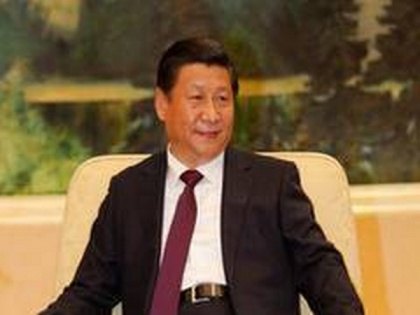Amid severe food crisis, Chinese govt asks citizens to control food habits
By ANI | Published: August 18, 2020 05:24 PM2020-08-18T17:24:48+5:302020-08-18T17:35:18+5:30
Chinese President Xi Jinping called its citizens to control food habits and "maintain a sense of crisis about food security" as the country is heading for a severe food crisis.

Amid severe food crisis, Chinese govt asks citizens to control food habits
Chinese President Xi Jinping called its citizens to control food habits and "maintain a sense of crisis about food security" as the country is heading for a severe food crisis.
Last week, Xi announced a food waste minimisation campaign as China continues to grapple with a slowing economy and the coronavirus pandemic disrupting the food supply chain.
He highlighted that the COVID-19 pandemic had "sounded the alarm" on over-eating food habits. Xi labelled attitudes toward excess food consumption "shocking and distressing".
The country has faced several food crises over the past year. The food crisis made worse after record flooding across southern China, which left farms wrecked and ruined tonnes of produce and a swine fever epidemic leading to the mass culling of pigs.
According to the Chinese government curbing food waste will help improve food security and strengthen the country's ability to cope with food imports.
Amidst the worsening ties with the US, China prepares for a worst-case scenario to achieve full self-reliance in food production.
The official data suggests that China imports about 20 per cent of its food supply, but in reality, it is estimated the actual volume may be as high as 30 per cent.
Following Xi's dictates, the Wuhan Catering Industry Association urged restaurants in the city to limit the number of dishes served to diners.
A system where groups must order one dish less than the number of diners. Under this system dubbed 'N-1', a group of 10 people can only order nine dishes. The system faced strong criticism, with people pointing out that it was "too rigid".
A restaurant chain in southern China has issued a public apology for weighing diners before they entered the premises as part of a national campaign to reduce food waste.
Customers going into the popular Hunan chain Chuiyan Fried Beef, in the city of Changsha, were asked to weigh themselves on a set of scales and provide personal information. The restaurant would then suggest menu items based on their physique.
The guide recommended customers order different dishes based on the person's weight and the calorie content of the food. For example, women weighing less than 40 kilograms (88 pounds) were recommended the chain's signature beef dish and a fish head, while men weighing more than 80 kilograms (175 pounds) were recommended dishes including braised pork belly.
Signs around the restaurant encouraged diners to "clean your plate" and "be thrifty and diligent." The move invited angry reactions among customers who accused the restaurant of 'fat-shaming'.
However, the campaign has received mixed reviews on social media, with some people worrying that it will lead to potential food price increases on the delivery platforms.
"One portion is too small for me, and now they are pushing half-dishes. Nowadays I order two dishes, so do I need to order four after this!" read one comment on the Twitter-like Weibo platform.
The Chinese government has warned social media apps that used to show popular streams of people eating enormous amounts of food and have also warned video creators could be blocked if they promote excessive eating.
It's not the first time China has launched an anti-food waste campaign. In 2013, the 'Operation Empty Plate' campaign was launched. Though that targeted extravagant feasts and reception held by officials, rather than putting the onus on the public.
President Xi is portraying the clean waste campaign as a move to help the international community during the pandemic, but in reality, China has for years had ambitions to cut the waste generated by its 1.4 billion citizens.
In July 2019, the city of Shanghai, the largest and most populous in the world, introduced strict regulations forcing individuals and compes to correctly recycle their food waste. Citizens faced fines as punishment for not complying, or penalties to their social credit rating, a controversial system affecting economic and social prospects. The Shanghai model has since been rolled out to other cities.
China is also facing a growing obesity problem. In 2016, the country overtook the US to have the greatest number of obese people in the world. And as China's labour market has shrunk, one of many negative impacts of the now-abolished one-child policy, longer studying and working hours, as well as bad eating habits, have fuelled weight gains.
( With inputs from ANI )
Open in app